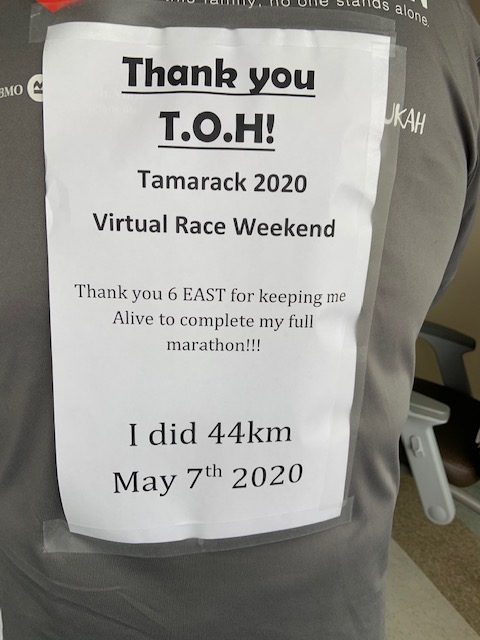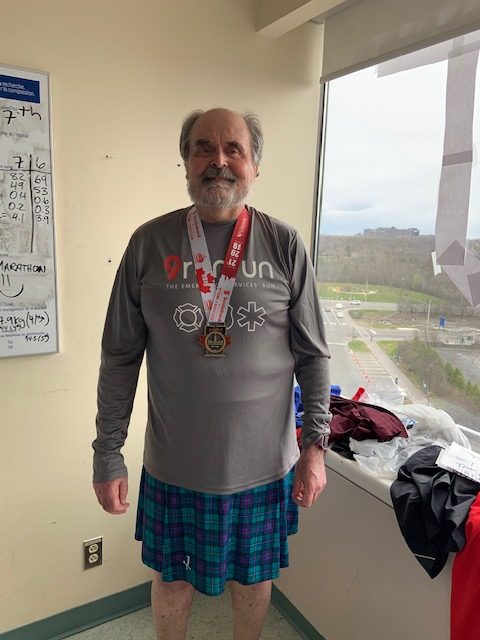Daniel McGlinchey, 66, is in the malignant hematology unit at the Ottawa Hospital, and he gets emotional when we talk. “I just didn’t know if I’d ever see my kids again,” says McGlinchey, a runner, who has done half marathons in Montreal, Quebec City, Toronto, Burlington and Montreal. He trains with the Running Room, and those runners have become something more than friends. “The things we’ve done together—once you start running with your community, you just know you don’t want to quit.” On May 7, McGlinchey walked the virtual Ottawa Marathon—467 laps of his 0.09K wing—to complete his race, just a few days after his forty-sixth anniversary. Ben Kaplan caught up with Daniel after he ate some cookies, and crossed his finish line.
iRun: Daniel, how do you feel?
DM: I’ve been in the hospital since April 20 and when I checked in here, I thought I was dead.
iRun: What do you have?
DM: A lot of health problems. So they’ve been doing chemo and radiation treatments, spinal taps, everything.
iRun: How does somebody go through all that and run a virtual marathon?
DM: The race weekend in Ottawa is virtual this year, because of COVID, and I was just sitting here. For five days, I couldn’t move, but I got some strength back and started walking around the hall. It’s good to exercise.
iRun: It’s good to move around. I don’t know how many people would do a marathon.
DM: I just kept going. I knew about the virtual race and since you go at your own pace, I did 44 kilometres in four days. I’m in Six East, and one rectangle loop around is .9 kilometres, so I did 44K.
iRun: It’s never a good time to be in the hospital, but now must be especially hard.
DM: It was our 46th anniversary on May 4, and it’s pretty frustrating because up on the fifth floor, I can’t see anybody and my wife couldn’t come in and so you’re really isolated in here, you wonder if you’ll ever see anyone, your wife, your kids, ever again. But the nurses and doctors were so nice. My wife couldn’t make me homemade cookies so the nurses brought me three boxes of President Choice chocolate chips. Excuse me, sorry I’m breaking up.

iRun: It’s OK. Small acts of grace in challenging times can mean so much.
DM: The whole team here, really, it’s just hard to discuss.
iRun: Talk about your running.
DM: I’ve done three Army Run Commander Challenges, 14 half marathons; I did the half marathon in Toronto, the Chilly Half in Burlington, Niagara Falls, a couple races in Montreal.
iRun: What is it you love about the sport?
DM: Three years ago, it was minus-30 and I did a half marathon. I’ve had two blood clots, so I can’t expose a millimetre of skin to the sun, but I did the Commander’s Challenge in 30-degree weather. I wore a kilt and long sleeve technical shirt, a Tiley hat—all of these things, but you know what? We get it done.
iRun: How do you manage not to do what so many of us are feeling right now—just curl up into a ball and weep?
DM: I just have to take it day by day. On top of the lupus and blood clots, I have a rare blood disorder and I’m on day twelve of my first round of radiation. I have no immune system. And still, I’m pretty happy. I held my same pace for my entire 44 kilometres.
iRun: Can you describe that incredible feat once again?
DM: Hospitals are pretty flat and each loop passed the nurses station, and they were such good motivators. Every lap, they’d be applauding and they had a nice finish line—there were 25 people at the finish line and that caught me by surprise.
iRun: You run with the Running Room?
DM: Yeah, the location at Kitsilano in Ottawa. I like going out with the people. We used to go five times per week when I first joined, we were gung-ho. It would be minus-30 and sleet, and we’d be there. Now, we’re older. Too many people kept falling. But we go to races all over the place and it’s a social thing. We go to dinners and coffee at Starbucks after our runs and chat for an hour.
iRun: You know, you sound pretty upbeat given all your ordeals.
DM: Only because sitting in the hospital I thought I was a goner. Once I got some energy, started walking around. I felt better, maybe it’s the endorphins. It’s very nice of you to call.

iRun: It’s my pleasure.
DM: I want to stay alive. I find inspiration in my kids. I’m pretty active and you know, you go in one race and you want to go in another one. I want to get back. Sometimes, you want to give up or don’t feel like training, but every time when it’s over, it lifts your spirits.
iRun: What do you want to say to people right now?
DM: Every kilometre makes a difference. Start with baby steps. And finish your race.






 Our Magazine
Our Magazine
